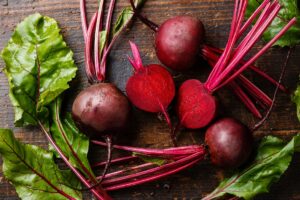 Beets just don’t show up on enough plates. Perhaps it’s because people are scared of them, don’t know how to cook them, or just flat-out don’t understand them.
Beets just don’t show up on enough plates. Perhaps it’s because people are scared of them, don’t know how to cook them, or just flat-out don’t understand them.
But give beets a chance.
Advertisement
These versatile – and delicious – root vegetables can probably do more than you think for your health.
First off, beets, or beetroot, are low in calories and high in phytonutrients, which are healthful compounds produced by plants. You can sort of see these nutrients indirectly in the beets natural dark purple hue. Typically, the richer the color of a fruit or vegetable, the more phytonutrients it has. There is certainly a lot to be said about the beet’s colour.
Apparently, medicinal uses for beets date back centuries. Ancient Romans may have had them to treat constipation, improve circulation, and fight fever.
These days, experts are excited about several beets benefits. For one, they are very high in nitrates, which can help improve cardiovascular health. Some research suggests that beetroot juice supplements may lower blood pressure and increase blood flow.
Nitrates in the juice – as well as whole beets – may increase oxygen uptake, which lengthens the amount of time it takes to become fatigued. This can help you stay active for longer.
Beets are also a rich source of antioxidants that can help promote cell health, repair DNA, and have anti-inflammatory effects. All of this can help reduce the risk of several chronic diseases.
Advertisement
Beets are also high in fiber, contributing to better digestion, cholesterol management, and heart health. Just a half-cup of boiled beets contains nearly 2 grams of fiber, which is quite a punch for such a small serving.
You can also get a good helping of vitamins A, C, and K from beets, which can help contribute to immune strength and bone health.
A lot of the research on beets features beetroot juice, but adding more vegetables to your plate is never a bad thing. You can try them raw in salads, boiled, baked, or dried.
